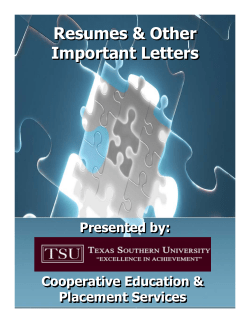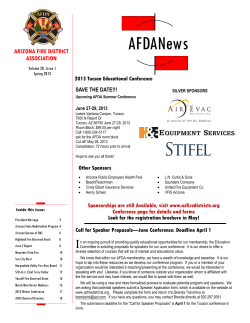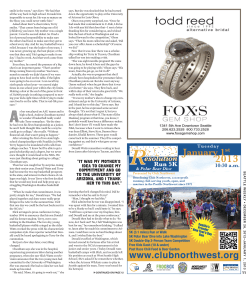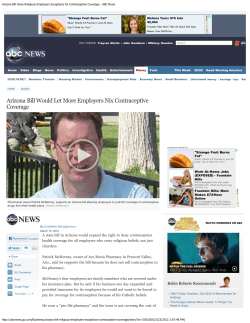
This questionnaire is co-sponsored by a group of child advocacy... service organizations in Arizona. All participating organizations are
This questionnaire is co-sponsored by a group of child advocacy and service organizations in Arizona. All participating organizations are prohibited from endorsing or opposing candidates. The purpose of this information is to educate voters on a range of issues that affect Arizona children and families. For more information, contact Joshua Oehler at joehler@azchildren.org. ϮϬϭϰƌŝnjŽŶĂ>ĞŐŝƐůĂƚŝǀĞĂŶĚŝĚĂƚĞYƵĞƐƚŝŽŶŶĂŝƌĞ Candidate Name Gary Cox Running for AZ Senate Date 6/27/14 Political Affiliation Republican District # 30 1. Please list ŽŶĞŽƌƚǁŽ children's causes or organizations that you have supported as a donor or volunteer, such as a local scouting group, a community organization, a parent-teacher organization at a school, or a charity. Asthma Camp for Kids Camp Elevate, Chad Johnson Ministries VBS Summer Programs 2. Governor Brewer and the state legislature recently passed new laws to create a stand-alone Department of Child Safety to protect children from child abuse and neglect and to strengthen families. The new budget focuses on adding child safety staff to reduce caseloads to manageable levels and handling the backlog of 14,000+ “inactive” cases where no case action has been ĚŽĐƵŵĞŶƚĞĚ for more than 60 days. Governor Brewer laid out a three-year plan with a vision to move resources from case investigation to prevention and family services as the backlog is reduced. On a scale from 1 to 5, please indicate your level of support for shifting resources to strategies such as child care assistance, substance abuse treatment, and professional parent mentoring to reduce the growth in reports of abuse and neglect and the need for foster care. 5 ----------------------------------------------------------------------------------------------------------------------------------------------1 ------------------------ 2 ----- -------------------- 3 ------------------------ 4 ------------------ ------- 5 don't support definitely support Optional comments I'm convinced the State of Arizona needs to engage the resources of private agencies as well as Churches to assist in solving this problem Page 1 of 6 Gary Cox 2014 Arizona Legislative Candidate Questionnaire 3. There are now more than 1ϲ,000 children in foster care in Arizona. They would fill every seat in Arizona Veteran’s Memorial Coliseum with some children standing in the aisles. Arizona is unusual – in most states, the number of children in foster care is going down. Placing children into temporary foster care due to child abuse or neglect is expensive for taxpayers, traumatic for children, and can leave children at long term risk for health problems, educational failure, unemployment and homelessness. Arizona has struggled with a shortage of foster families. WůĞĂƐĞĐŚĞĐŬĂůůŽĨƚŚĞƐƚƌĂƚĞŐŝĞƐLJŽƵ support to diminish child abuse and neglect and reverse the trend of the rising number of children in foster care? ✔ Improve training, supervision, and caseloads for Child Safety staff so that they can make good decisions about protecting children. ✔ Enhance the quality and availability of family support services to keep children safely with their families, such as substance abuse treatment and parent counseling. ✔ Allow more qualified low-income working parents to participate in child care assistance so that they can afford safe child care while they go to work and avoid neglect situations. ✔ Contract with community agencies to provide support in low-risk cases and help struggling families succeed. ✔ Focus efforts on moving children out of foster care more quickly into safe and permanent homes. Optional comments 4. Medicaid – called AHCCCS in Arizona – is an important source of health coverage for many uninsured and low income Arizonans. The Young Adult Transitional Insurance program provides qualified foster youth the opportunity to maintain health insurance through Medicaid until the age of 26. These young people face huge hurdles as they transition to adulthood – many suffering unemployment, homelessness, and major health problems after growing up in foster care. Currently, there are paperwork requirements and extra steps that make it hard for young adults to enroll and stay covered in AHCCCS. Would you support streamlining the application and renewal process so that ĨŽƌŵĞƌĨŽƐƚĞƌLJŽƵƚŚ can get and maintain AHCCCS coverage when they qualify? Yes No ■ Maybe Optional comments Yes for the developmentally disabled and catastrophic illness if they have no other insurance recourse but I do not support expansion of Medicaid to 133% of FPL, it's unsustainable economically Page 2 of 6 Gary Cox 2014 Arizona Legislative Candidate Questionnaire 5. Many parents cannot afford child care costs of $5,000 to $10,000 per child per year. State and federal tax dollars have helped to fill in the gap for Arizona working families with a voucher that pays part of the cost of the child care that parents choose while they go to work. Since February 2009, state budget cuts have frozen enrollment for working families and the number of participating children has dropped from 29,000 in 2009 to 7,500 in 2014. This leaves thousands of children in unsafe or unstable child care and reports of child neglect during those years have skyrocketed. For fiscal year 2015, Governor Brewer and the state legislature lifted the freeze and provided funding to assist a minimum of 8,500 children. Please place an X on the scale below indicating your level of support for restoring more state funding for child care to promote early education, prevent child neglect situations, and help parents stay working. X ----------------------------------------------------------------------------------------------------------------------------------------------1 ------------------------ 2 ----- -------------------- 3 ------------------------ 4 ------------------ ------- 5 don't support definitely support Optional comments Funding for all assistance programs is dependent on the available dollars and Arizona can only provide assistance to the level of available dollars no matter the program 6. As a budget cutting strategy, Arizona froze enrollment in KidsCare health coverage effective January 2010, making Arizona the only state in the country to dismantle its KidsCare program. Many lawmakers assumed that the Affordable Care Act would open up affordable health insurance plans for families with children. But a new analysis by CAA and the Georgetown University Center for Children and Families shows that, without KidsCare, many families will not be able to afford to insure their children. Compared to KidsCare, the new Marketplace plans have much higher out-of-pocket costs. Parents of children with special health care needs, like autism, cancer, and cerebral palsy will face substantial costs that could be 35 times higher than their costs for KidsCare and exceed 15% of their family’s income. Please place an X on the scale below indicating the priority you would give to creating affordable coverage options for children with special health care needs living in low income families. X ----------------------------------------------------------------------------------------------------------------------------------------------1 ----------------------- - 2 ----- -------------------3 ------------------------ 4 ------------------ ------- 5 lowest priority medium highest priority Optional comments As stated above, all assistance programs are dependent on the availability of funding. Sadly, revenues can only be stretched so far. The answer to giving low income families better opportunities are through economic growth and the attraction of new business and new jobs to our State that will provide higher paying job opportunities and economic empowerment. Page 3 of 6 Gary Cox 2014 Arizona Legislative Candidate Questionnaire 7. Arizona’s state legislature has passed new tax cuts and tax credits every year but one since 1990. Total Arizona state revenues have fallen 24% as a share of the state’s economy between 2000 and 2013. While state revenues are recovering from the recession, they are still lower than the FY 2007 level. The vast majority of budget cuts to education, child care, and children’s health care made during the recession have not been restored. The Joint Legislative Budget Committee predicts that starting in FY 2016, Arizona will face budget deficits due to the expiration of the temporary sales tax, the court requirement to fully fund inflationary costs in K-12 education, higher Medicaid costs, and the phase-in of major tax cuts that have been passed in recent years. Projected FY 16 Deficit of $613 Million 77% due to tax cuts passed since 2009 Please check the two statements that you most agree with about Arizona's state fiscal policies: State spending and taxes are still too high. We need to cut them both. ✔ Our state revenues are insufficient to meet the voter priorities of public safety, education, and health care. Our total level of spending is about right. We need to spend less in some areas and more in others. If we cut taxes more, businesses will create more jobs in Arizona and families will be stronger. ✔ If we invest in infrastructure, job training, and education, businesses will create more jobs in Arizona and families will be stronger. Our tax system is out-dated and looks like Swiss cheese after years of tweaks and revisions. We should update our tax structure to match today’s economy and make the tax code more consistent. We should continue current tax credits for businesses and individuals only if they are achieving the goals we want. Optional comments We must expand and grow Arizona's economy in order to be able to invest in and sustain our State infrastructure. We're behind on job recovery in order to adequately fund voter mandates 8. Business leaders know that a quality education system is needed for a strong economy. Parents and educators know that our children need to learn 21st century skills in order to succeed. At the same time that lawmakers raised education expectations, graduation requirements and teacher performance standards, they also cut school funding. The Arizona Joint Legislative Budget Committee (JLBC) data show a 25% drop in total state funding for K-12 education per student – a drop of $1,129 per student from 2008 to Page 4 of 6 Gary Cox 2014 Arizona Legislative Candidate Questionnaire 2014. U.S. Census data show that Arizona’s total 2012 spending on public K-12 schools per student was 29% ($7,559) below the national average. According to the National Assessment of Educational Progress (NAEP), about 7 out of 10 Arizona eighth graders score below proficient in reading and math. Do you think the state budget for K-12 education is too high, too low, or just about right? Too high Too low About right Optional comments None of the above, I believe there needs to be a reshuffling of funding with more dollars going to teachers and classrooms and less to administration Third Grade AIMS Reading Scores Falls Far 9. The end of third grade marks the point when children transition from learning to 2013 Below read to using reading to learn other subjects. Children who read proficiently 4% Exceeds by the end of third grade are more likely to graduate from high school and to 13% Approaches be economically successful in adulthood. Last year, 25% of third graders 21% throughout the state failed the AIMS reading test. New state laws require all school districts to hold back third graders who score far below grade level in reading. Reading success begins long before third grade. Research shows poor children start Kindergarten already behind their peers; they have heard ϯϬmillion fewer words than children in higher income families. Meets 62% Please ĐŚĞĐŬĂůůŽĨƚŚĞstrategies you would support to give parents, child care teachers, and elementary school teachers the tools for reading success: ✔ Reading programs and education for parents and children together. State funding to improve access to quality preschool and child care education for poor children. ✔ Professional reading coaching for child care teachers and elementary school teachers. ✔ Reading programs for children after school and during the summer. Full-day Kindergarten ✔ Assessment tools so that parents and teachers can see whether children are on track in reading Other/Optional comments There needs to be more parental involvement and responsibility for assuring children have appropriate reading skills. Page 5 of 6 Gary Cox 2014 Arizona Legislative Candidate Questionnaire 10. Please list your top two priorities to improve children's health, education, or security should you be elected. 1. I support the Governor having direct oversight of Child Protective Services but there must be meaningful systemic changes to assure failures of the past don't continue 2. Education is absolutely fundamental to assure children are literally and educationally functional at a sufficient level to thrive and prosper when they reach adulthood Please use this space for additional comments. The economic downturn and the lack of recovery of jobs has had an obvious negative impact on our State budget. Social programs can only be adequately funded when those funds are available. There must be an intense focus by our Governor and our State Legislators to attract new businesses to our State and to create an environment for existing businesses to be able to expand. By doing so, thousands of new, and most likely, well paying jobs will be created. An expanded tax base, as opposed to adding tax burden to existing taxpayers is by far the preferable way to building State revenues that will allow adequate budgetary funding of the many numerous programs that must, and need to be, funded. My campaign is focused on helping families succeed. I could care less whether or not a Citizen of our State is a Republican, Democrat, Independent, or other Party. My concern is to help hurting families who have been struggling. We can't help people by making them more dependent. We help them by lifting them up and helping them achieve; having opportunities for the best possible education, the best possible healthcare, and the best jobs available. We must always help the truly needy but we must also fight for families to have every opportunity for success and independence. Page 6 of 6 Gary Cox
© Copyright 2025





















